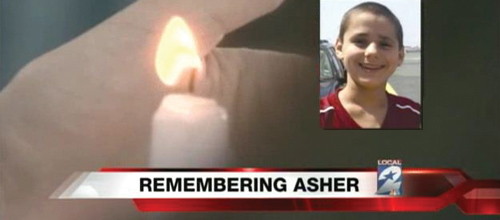
Bullying Comes Out of the Closet
The list of gay teenagers who took their own lives during the month of September 2010 has become a media litany. Billy Lucas. Cody Barker. Seth Walsh. Justin Aaberg. Tyler Clementi. Asher Brown. Raymond Chase. Felix Sacco. Harrison Brown. Caleb Nolt. Jon Carmichael.
The grim list grew so quickly that the press and the public lost count. By the end of the month, at least 11 young men ranging in age from 13 to 19 had committed suicide when they could no longer deal with the bullying they had endured for years.
For residents of Houston, the growing news story became especially real on September 23, 2010, when 13-year-old Asher Brown, a student at Hamilton Middle School in the Cypress Fairbanks school district, died of a self-inflicted gunshot wound. Tormented by bullies for years, young Asher’s spirit finally broke when he was tripped on a school stairway and fell down five steps the day before.
A boy with a gentle personality, Asher had been bullied because of his short stature, the clothes he wore, the fact that he was a Buddhist, and because he was gay. He had endured name calling, humiliation, and physical assault. In the school locker room, more powerful classmates had often grabbed him and simulated anal sex.
For members of the gay community, the news had a familiar ring: statistics revealed years ago that gay youth are four times more likely to be the target of bullying than their heterosexual classmates are.
In the past, media reports of gay teen suicides had been just another story. But the string of 11 deaths within 22 days finally set off a media tsunami. Bullying has become the talk of the nation. “It’s sad that this is what it took to finally bring the issue to light,” says Kris Banks, the current president of the Houston GLBT Political Caucus.
Across the country, seemingly everyone had something to say about the tragedies. Blame was directed at a multitude of suspected sources—the schools, the bullies, the parents, fundamentalist religious organizations, and even the victims themselves.
Ellen DeGeneres told her talk-show audience: “One life lost in this senseless way is tragic. Four lives lost is a crisis. And these are just the stories we hear about.” Anderson Cooper hosted a 360 Town Hall Meeting on CNN. People magazine ran a cover story, “Bullied to Death,” and devoted a record 15 pages to the subject. The ladies on The View talked about the increase of homophobia and suicide.
President Obama told an MTV Town Hall: “Our heart breaks when we read about what happened at Rutgers, when we read about some of these other young people who are doing nothing to deserve the kind of harassment and bullying that just completely gets out of hand.”
Celebrities Kathy Griffin, Wanda Sykes, Lance Bass, and Tim Gunn came together on Larry King Live. Even Perez Hilton came forward and said, “I’m going to do things differently. I’m not going to go the mean route.” Rap singer Eminem, recalling the savage bullying he was subjected to in high school, recorded an anti-bullying song entitled “No Love.”
An accompanying video was posted on YouTube on September 29, and by late October had been seen by 11 million viewers.
Savage Love columnist and author Dan Savage and his husband, Terry Miller, launched a campaign called “It Gets Better,” asking former victims of bullying to post homemade videos on a YouTube channel, telling young people how life finally got better for them. President Obama and Secretary of State Hillary Clinton have recorded messages for the campaign.
“Spirit Day” was organized at the national level, asking that the recent victims be remembered by wearing purple on October 20, 2010. The campaign was sponsored by the Gay and Lesbian Alliance against Defamation (GLAAD). In Houston, OutSmart designed a special graphic to temporarily replace Facebook profile pictures with a purple graphic.

Broadway stars gathered together and recorded an amazingly powerful song and video entitled “It Gets Better,” in a “We Are the World” format, for The Trevor Project. Facebook announced an all-out effort to rid that online social network of homophobic remarks. MTV offered a cell phone application that allows users to report bullying episodes. The program also lets friends indicate what they feel is the severity of the bullying.
Judy Shepard, mother of murder victim Matthew Shepard, was profiled in the October issue of OutSmart. Contacted for this report, she said: “Twelve years after losing Matt, I thought that we were on a better path, particularly with our young kids’ acceptance of not only who they are, but acceptance by their peers of who they are. I guess we have further to go than I thought.”
Americans were touched to the core when openly gay Ft. Worth Councilman Joel Burns addressed the Ft. Worth City Council on October 12, speaking about the recent gay teen suicides. (www.youtube.com/watch?v=ax96cghOnY4.) Burns decided to make the remarks after he heard of a young man who attended a city council meeting in Norman, Oklahoma, then went home and took his life after hearing speakers at the meeting attack a Gay History Month proclamation with hated-filled remarks.
Burns read from a quickly prepared draft, making an emotionally raw, tear-filled delivery. Within minutes of the speech being posted to YouTube, it went viral across the Internet. The mainstream media quickly latched onto the video and played it on national and local media outlets, resulting in over two million YouTube views of his 13-minute speech.
But darker comments also quickly emerged. Tony Perkins, of the fundamentalist Family Research Council, wrote in the Washington Post: “The most important thing that Christians can offer to homosexuals is hope—hope that their sins, just like the sins of anyone else, can be forgiven and their lives transformed by the power of Jesus Christ. Jesus’ command to love our neighbor clearly embraces the homosexual as well. But love does not require affirming every behavior in which an individual engages.”
Bryan Fischer of the American Family Association offered his advice: “The sudden surge of gay teens committing suicide could be stopped if society would simply help teens resist the self-destructive impulses of homosexuality and redirect their sexual energies in healthy and life-giving directions.“
Focus on the Family’s Candi Cushman responded to the tragedies by saying: “Here at Focus on the Family, we believe that children need to be safeguarded not only against bullying but also against desensitizing sexual messages, especially when those messages are presented to them against their parents’ will. Unfortunately, it’s precisely this kind of messaging that gay activists propose to introduce into our schools by way of the materials they’re marketing under the name of anti-bias lessons.“
Focus on the Family sponsors a website entitled “True Tolerance,” which teaches parents how to dismantle gay-inclusive anti-bullying programs in their schools. The home page of the website says: “Concerned about homosexual advocacy in your child’s school? You’ve come to the right place.” The group warns parents that “anti-bullying initiatives are gay activists’ latest tools of choice for sneaking homosexuality lessons into classrooms.”
Concerned Houstonians React
Asher Brown’s parents, David and Amy Truong, organized a public memorial service. They had expected 30 or 40 people, but several hundred responded and participated.

An anti-bullying demonstration was organized by the Foundation for Family and Marriage Equality across the street from Cy-Fair’s Hamilton Middle School on October 5, just as school was letting out. The foundation has organized many Right to Marry demonstrations, and decided to put their skills to work to honor Asher. Barry Ouellette explains that the group took ownership of the rally and vigil when it appeared that no other efforts were in process. Their candlelight vigil attracted nearly 100 people and lasted for two hours, as those present took turns sharing their feelings.
Chris Arasin, heading up “Project Asher” on YouTube, invited members of the community to come and share their stories on video about how “it gets better.”
Mark Levine, education director for Congreation B’rith Shalom in Bellaire, says that the synagogue is committed to becoming a safe haven for LGBT youth. Levine, who is openly gay, has been asked to implement their anti-bullying program.
Bullying is when someone keeps doing or saying things to gain power over another person. Bullying can be physical, verbal, mental, or sexual, and can become especially harmful when it takes place online.
Physical bullying is evidenced by hitting, kicking, pushing, choking, punching, taking or damaging belongings, or making someone do things they don’t want to do. Verbal bullying includes threatening, taunting, teasing, starting rumors, and using hate speech.
Mental bullying is accomplished by leaving someone out of activities, not talking to them, threatening them, and making them feel uncomfortable or scared.
Sexual abuse can range from unsolicited sexual comments and advances to date rape and vicious sexual attacks.
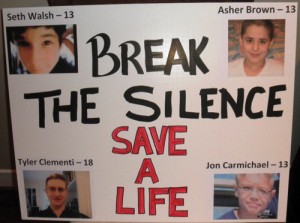 Cyber-bullying means texting unsolicited abusive comments, posting rumors on online social networks, posting hateful messages to online forums, and generally using the entire range of modern technology—such as cell phones, iChat, Flicker, Twitter, Facebook, and myYearbook—to demoralize and frighten. Closely related to cyber-bullying is the use of web cameras to stream embarrassing videos of victims—the stunt that resulted in Tyler Clementi’s suicide.
Cyber-bullying means texting unsolicited abusive comments, posting rumors on online social networks, posting hateful messages to online forums, and generally using the entire range of modern technology—such as cell phones, iChat, Flicker, Twitter, Facebook, and myYearbook—to demoralize and frighten. Closely related to cyber-bullying is the use of web cameras to stream embarrassing videos of victims—the stunt that resulted in Tyler Clementi’s suicide.
Far from being isolated events, bullying is frighteningly commonplace across the country, according to a recently released Clemson University study. In the largest survey of its kind to look at the issue, researchers surveyed 524,054 students at 1,593 schools across the nation over the last two years to get a better picture of bullying in grades 3 through 12. They found that one in every six students is bullied.
There are dozens of websites sponsored by anti-bullying organizations. “Stop Bullying Now” provides information for bullies, their victims, and bystanders. “Bully Police USA” grades each of the 50 states on their anti-bullying legislation. Texas received a C-minus.
Bullying is a widespread problem that affects the entire country. Victims cross all demographic lines—gender, race, sexual orientation, height, weight, academic ability, religious expression, clothing, disability, economic status, and national origin. However, bullying of gay, lesbian, bisexual, and transgender youth is four times more likely than bullying of heterosexual youth.
In searching for solutions to bullying of gays, it’s important to remember that straight people experience bullying, too. All groups of bullied individuals need to become allies.
Zack Pruit, a heterosexual male who grew up in Houston’s East End, remembers being the only Caucasian in a predominantly Hispanic area. He reports: “I am quite familiar with being bullied, too. Being that I was shy and felt like I was different, it seemed like I had a bull’s-eye on my back. It seems like the more you want to just be incognito, the more you stick out. I do feel for Asher and all those who are victims of this kind of treatment.”

Regan Hartley, second runner-up in the 2009 Miss New Hampshire pageant, recalls: “I was brutally attacked in my high school cafeteria by a group of girls at Dover High School. These girls not only physically hurt me, but permanently hurt me mentally as well. There is not one day that has gone by in the past four years that I have not thought about what they did to me, and how they made me feel. I spent the majority of my lunches in the girl’s bathroom—scared to go where I knew I wasn’t wanted.”
Hartley plans to compete in the 2011 Miss New Hampshire pageant, and if she goes on to win the state or national title, she will make anti-bullying her cause. She says that she still receives e-mails from young girls who ask her for advice about dealing with bullies.
Bullying and Suicide
Recently, the term “bullycide” has become a catch-phrase. Typing the word into Google’s search box brings back an overwhelming variety of stories about teens who have committed suicide because of bullying.
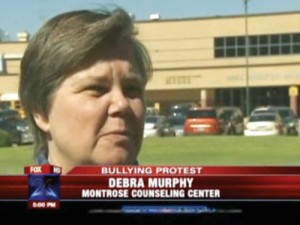
Deb Murphy, who heads up HATCH, the Houston group dedicated to empowering GLBT adolescents, says it’s important to understand the relationship between bullying and suicide: “Bullying is not the cause of suicide. It is the catalyst. The real cause of suicide is isolation.
“There are four pillars that form the foundation of an individual’s life—family, peers, spirituality, and career,” Murphy says. “For youth, their career is school. When their pillars are knocked away, one by one, the result is extreme isolation—a feeling of hopelessness and a sense that things will not get better. If they believe that they don’t belong, that they have no value, and that the world would be better off without them, suicide becomes an option.
“For teens, it’s the most difficult,” she continues. “Adolescents feel their brains and bodies changing. They have raging hormones. And they are beginning the first stages of separation from their parents. The most important thing to them is their peers. If we’re going to stop suicides, we have to deal with the isolation many teens feel.”
Indeed, in the big picture, there is more hope for success in ending teen isolation than there is in stopping bullying. Bullies bully for a reason. And bullying is learned behavior. Simply punishing a bully does nothing to address the cause of their bullying. Intervention is necessary for both the bully and the victim.
Ideas That Work
“HATCH has a zero suicide rate,” says Sally Huffer of the Montrose Counseling Center (MCC), where HATCH is located. The Gay and Lesbian Switchboard, a key intervention resource, also operates out of MCC.
Murphy says that HATCH limits participation to youth between 13 and 20 years of age. Beyond that range, it’s too difficult to deal with the age differences. HATCH was founded in 1987, and continues to provide a place where gay and lesbian youth can meet, share concerns, and support each another. Youth come from as far away as Conroe and Lake Jackson to be a part of the HATCH “family.”
“A new participant is ‘the new kid’ for one meeting,” Murphy observes. “We make sure they feel valued and included. Sometimes they just sit and watch for three or four meetings. But they finally begin to open up.”
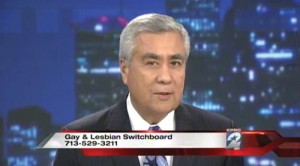 Murphy also works in conjunction with the the newly formed Houston chapter of the national Gay, Lesbian and Straight Education Network (GLSEN). Kim Case, director of Houston GLSEN, identifies their two main goals as training educators and supporting Gay/Straight Alliances within schools. “GLSEN uses programs that have proven to be ‘best practices.’ We originally set up metrics for determining success. Then we implemented programs. And finally, we evaluated the degree of success of those programs, based on the metrics. We can show school administrators that they don’t have to re-invent the wheel, and we can show our track record.”
Murphy also works in conjunction with the the newly formed Houston chapter of the national Gay, Lesbian and Straight Education Network (GLSEN). Kim Case, director of Houston GLSEN, identifies their two main goals as training educators and supporting Gay/Straight Alliances within schools. “GLSEN uses programs that have proven to be ‘best practices.’ We originally set up metrics for determining success. Then we implemented programs. And finally, we evaluated the degree of success of those programs, based on the metrics. We can show school administrators that they don’t have to re-invent the wheel, and we can show our track record.”
Case is currently working to build a network of allies and advocates at Houston-area schools. “When we have an ally who will introduce us personally to a school’s principal, we’re off to a solid start. We tailor suggested resources to each individual school, because there is no one [solution] that can work for all schools.”
GLSEN begins at the kindergarten level, offering lesson plans to help students create art pieces that express their feelings about name-calling, bullying, and harassment. Age-appropriate lesson plans are available for classes from kindergarten through the 12th grade. The New York State School System recently contracted with GLSEN for three years.
Case looks forward to helping students at area schools form Gay/Straight Alliances as recognized school clubs. “One day we want to pull together a GSA Senate, [made up] of representatives from all the local alliances.”
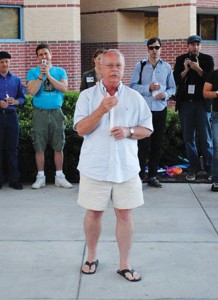
Influencing the School Systems
Tim Bacon has been involved with the Texas State Teachers Association for more than 20 years as an organizer and government-relations specialist. He has visited legislators, testified before legislative committees, and met with teachers to form grassroots anti-bullying solutions.
Bacon says that school counselors basically are limited to helping students schedule their classes, and there is little or no time for them to deal with students’ emotional issues. “But every adult on a campus—teacher, counselor, administrator, even the bus driver—should be able to help a child that is being bullied. The Texas Counselors Association has conducted bullying workshops for counselors, but not administrators, teachers, or students.”
“Every school is an island,” says Bacon. “The values of the principal trickle all the way down. Moving up the chain, the principals usually reflect the values of the district superintendent.”
It’s important not to demonize an entire school system. There are schools that are already doing a good job, and those schools should know they have community support. The challenge is to identify the less sensitive schools and work to change their cultures.
School boards ultimately set policies that all district schools must comply with. In the future, school board elections should become very important to the local gay community. The Houston GLBT Caucus has endorsed Juliet Stipeche for Houston Independent School Trustee, District VIII. Two other candidates sought the Caucus endorsement. Stipeche says that if she is elected, she will work to see that HISD’s bullying policy is enforced uniformly throughout the system.
Bacon encourages members of Houston’s gay community to run for seats on their local school boards. He is eager to meet with any person contemplating the idea, so he can explain the basics of mounting a campaign.
Legislative Proposals and Failures
Texas State Representative Garnett Coleman first introduced the “Dignity for All Students Act” in 1997, with co-sponsor Jessica Farrar. The bill would require schools to implement anti-bullying policies, and it included LGBT youth in its group of targeted individuals. It was not adopted.
“Jessica and I will introduce the bill once again, into the 2011 legislature,” Coleman says. He is considering re-naming the bill in memory of Asher Brown. “Hopefully, Asher will not have died in vain.”
Constituents can contact their elected state officials and voice support for the bill—and ask their officials to sign on as co-sponsors. For parents of bullied students, a trip to Austin with their child is a way to make the bill become more personal to elected officials.
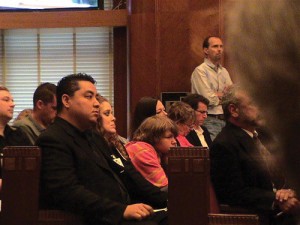
Houston’s Federal-Local Hearing on Bullying
U.S. Representative Sheila Jackson-Lee held a federal-local hearing devoted to the issue of bullying on October 18, 2010, in the Houston City Council Chamber. A standing-room only audience packed the chamber.
Representatives from HISD and the Houston Police Department testified, as well as Harris County District Attorney Pat Lykos. Asher Brown’s parents, David and Amy Truong, spoke about the lack of concern at Hamilton Middle School, where their son Asher Brown attended. “I have a cell phone log of 26 calls to the school,” said Amy Truong. “And that doesn’t count the calls I made from work.” Yet school officials contend that the Truongs never contacted them. The Truongs are currently working with an attorney to sue the school, and the District Attorney has ordered an investigation.
Numerous parents brought their bullied children downtown to testify at the hearing. Tearful mothers—and some tearful fathers—begged the hearing panel to do something to stop the bullying. They described numerous occasions where school officials accused them of hurting the school’s reputation. Representative Jackson-Lee instructed all parents to report to her office any reprisals that might arise from their testimony.
Asher Brown’s friend Garrett, standing alongside his mother, told the panel that some students at Hamilton Middle School “think Asher’s death is funny, and are making jokes about it.”
A teenage girl told of being slapped by a 14-year-old football player during a football game, and no action was taken against him. He was not removed from the game, and no one talked to his parents who came to pick him up.
One of the complainants heatedly asked what the panel members’ reaction would be if he were to cross over the chamber’s security barrier and slap one of them across the face because he didn’t like their hair. It made a shocking point.
Councilmember Jolanda Jones encouraged children to “be a snitch and become a hallway hero. Earn a medal.”
Activist Quanell X told the panel: “Punish the principals and superintendents—and that’s all the legislation you’ll need.”
The gay community was highly visible at this hearing, with representatives from the Human Rights Campaign (HRC), Equality Texas, GLSEN, the Houston GLBT Community Center, and PFLAG. Randall Ellis, formerly the chief of staff for Garnett Coleman, spoke about Coleman and Farrar’s proposed statewide anti-bullying bill.
Ebie Hussey, a PFLAG board member, testified: “Speaking from my heart, I want a level playing field. All I need is for my son to be safe. He does not deserve to be called a ‘fag’ every day in the hallway of his school. He does not deserve for teachers and administrators to turn a blind eye to those who make inappropriate comments and gestures. He should be able to ride the bus and attend classes without fear of violence or hateful rhetoric.”
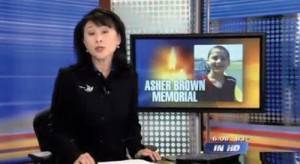 Congresswoman Jackson-Lee plans to advocate for federal hearings on bullying to be held in Washington. She offered a suggestion that federal school funding guidelines be expanded to include statistics about bullying. Among the federal funding metrics should be the number of bullying incidents and the degree of the bullying at each school. Dropout figures and days of school missed by students could also be used.
Congresswoman Jackson-Lee plans to advocate for federal hearings on bullying to be held in Washington. She offered a suggestion that federal school funding guidelines be expanded to include statistics about bullying. Among the federal funding metrics should be the number of bullying incidents and the degree of the bullying at each school. Dropout figures and days of school missed by students could also be used.
The hearing was extended for an extra hour—to four hours—in order to give every witness in attendance a chance to speak. Noticeably absent as witnesses were local school superintendents and principals.
Among the long list of witnesses was one small girl wearing a T-shirt that read “I’m Getting Educated, Not Incarcerated.” She spoke to the panel about her background and about the bullying she has endured. Then she appealed to them to help stop the bullying “because I am precious.” She brought down the house with sustained applause.
Brandon Wolf is a frequent contributor to OutSmart magazine.
__________________________
17 Signs That Your Child May Be a Victim of Bullying
1. May refuse to talk about what’s wrong.
2. May be frightened of walking to and from school, or may change their usual route.
3. May not want to go on the school bus or may beg someone to drive them to school.
4. May be unwilling to go to school or become “school phobic.”
5. May feel ill in the mornings.
6. May do poorly in their school work.
7. May come home regularly with clothes or books destroyed.
8. May come home seemingly starving or continually “lose” pocket or lunch money.
9. May have their possessions go missing, or may ask for money or start stealing.
10. May become withdrawn, start stammering, lack confidence, become distressed and anxious.
11. May stop eating or eat too much.
12. May cry themselves to sleep.
13. May have nightmares.
14. May have unexplained bruises, cuts, scratches.
15. May begin to bully other children or siblings.
16. May become aggressive and unreasonable, or act out of character.
17. May attempt or threaten suicide.
Source: New Hampshire Bully Watch (www.nhbullywatch.org)



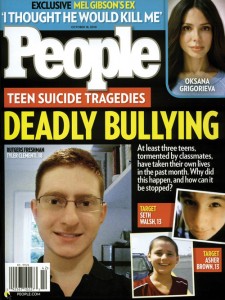
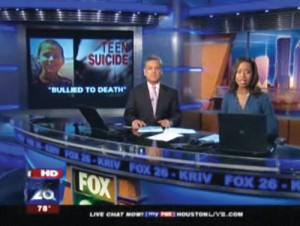
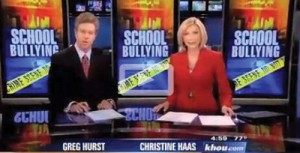









Comments